Having the best e-commerce website builder eases the process of online store creation. From store design and core functionalities to shipping, tax calculation, SEO, marketing, and more, a proper e-commerce site creator will inevitably come in handy. However, finding an adequate one can be daunting. This is especially the case if you’re inexperienced and directionless.
We’re here to end your struggle today. After testing over thirty website builders, we separated the best e-commerce picks. Then, we analyzed them further and narrowed the selection to five. We found that they tick all the boxes for effortless and efficient online selling.
The 5 Best E-Commerce Site Builders Compared
- Wix – the overall best e-commerce platform in 2025
- Shopify – best for large online shops and companies
- Squarespace – great for designing stunning online stores
- Hostinger Website Builder – a cheap e-commerce site creator
- Weebly – a free website builder for selling online
Best E-commerce Website Builders: Detailed List
Are you looking for detailed reviews of the top-ranking e-commerce site builders? Let us explain the reasoning behind our comprehensive list. Scroll down and learn more.
1. Wix
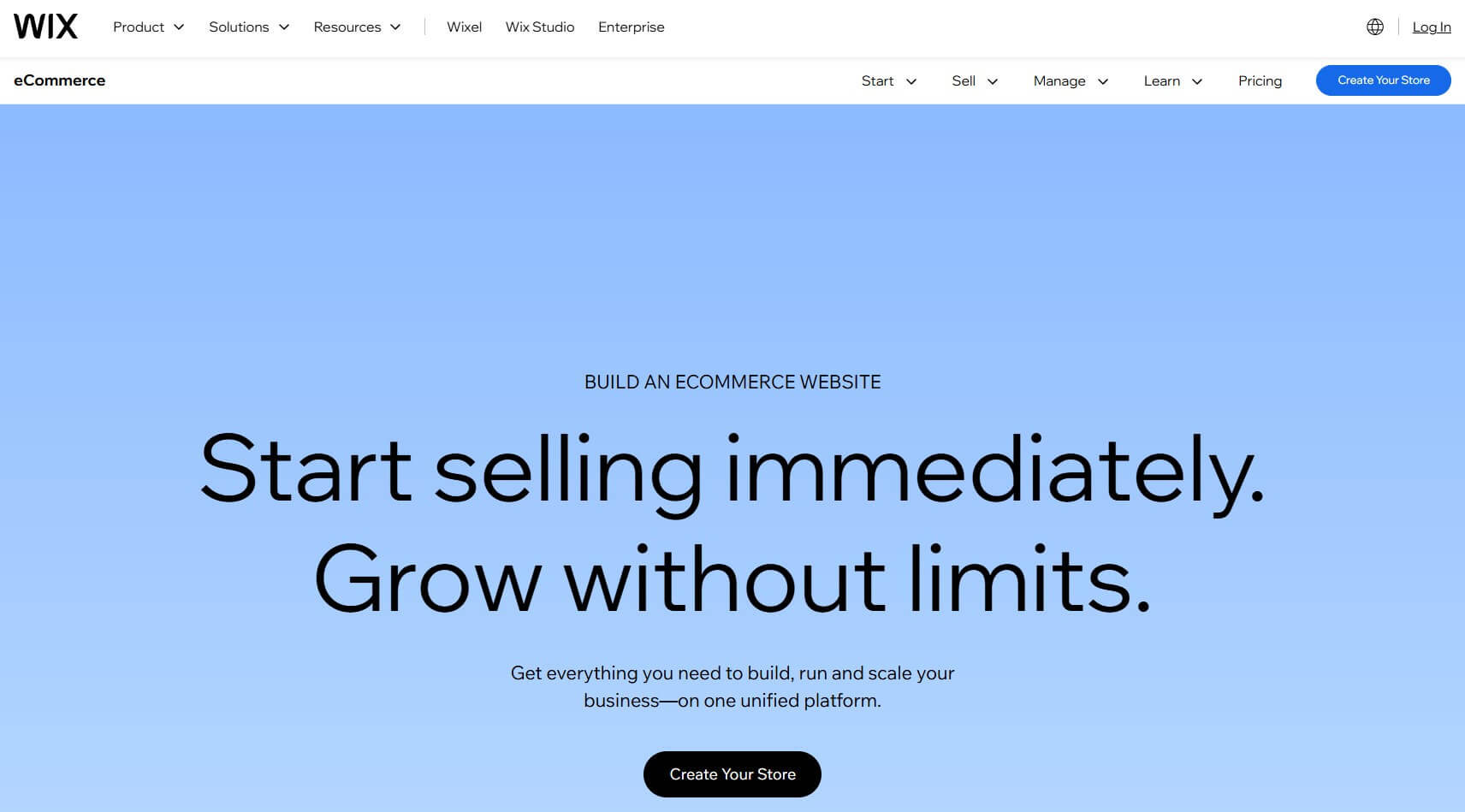
As explained in our lengthy Wix review, this is the best all-arounder. You can use it for blogging, selling online, or even creating stunning portfolios. As e-commerce site builders are our focus today, we’ll emphasize Wix’s associated features.
So, how good is it really?
Pros
- Advanced shipping options and rules
- Low transaction fees
- Built-in email marketing
- POS (Point of Sale)
- Wix Payments integration
- Free domain for a year
Cons
- Not very affordable
- No e-commerce in the free plan
E-commerce Features
Wix e-commerce features include multi-channel selling, advanced shipping options, dozens of payment vendors, intuitive inventory management, coupon codes, customer reviews, and more. Each e-commerce-friendly plan also allows you to sell up to 50,000 products, which even larger stores will find sufficient.
We also love that Wix has built-in email marketing, which helps promote your products and drive more sales. Simultaneously, Wix’s SEO tools aid keyword research and website optimization for better rankings. For example, it supports a Semrush integration, which we found incredibly useful.
As the best e-commerce website builder of 2025, Wix also provides extensive traffic analytics. For example, you can discover your visitors’ language and country. Regarding online sales, Wix’s fees are 0%, so it’s great for small online shops, albeit third-party vendors take their share.
On average, the fees are 2.9% + $0.30, but this depends on the customer’s location and payment method. The good thing is comprehensive support for payment vendors, such as PayPal, Klarna, Affirm, credit/debit cards, and Wix Payments, which encapsulates all these and eases payment receiving.
On the site-building front, Wix offers 900+ templates, many of which are optimized for online stores. You’ll enjoy a helpful drag-and-drop editor with Wix’s famously intuitive interface for website management. All this makes Wix our favorite e-commerce website builder.
Plans & Pricing
How much is it, though? If you claim our Wix coupon, you can save 10% on top, but its default prices are:
- Core – $29 monthly
- Business – $39 monthly
- Business Elite – $159 monthly
Wix isn’t the cheapest option. However, the $29 Core plan is sufficient for most online stores. With 50 GB of space, a free domain for a year, and up to five collaborators, it contains all you need to sell online efficiently. If you can afford it, the Business plan is also excellent value.
It’s worth noting that Wix offers a non-e-commerce free plan and a 14-day money-back guarantee.
2. Shopify
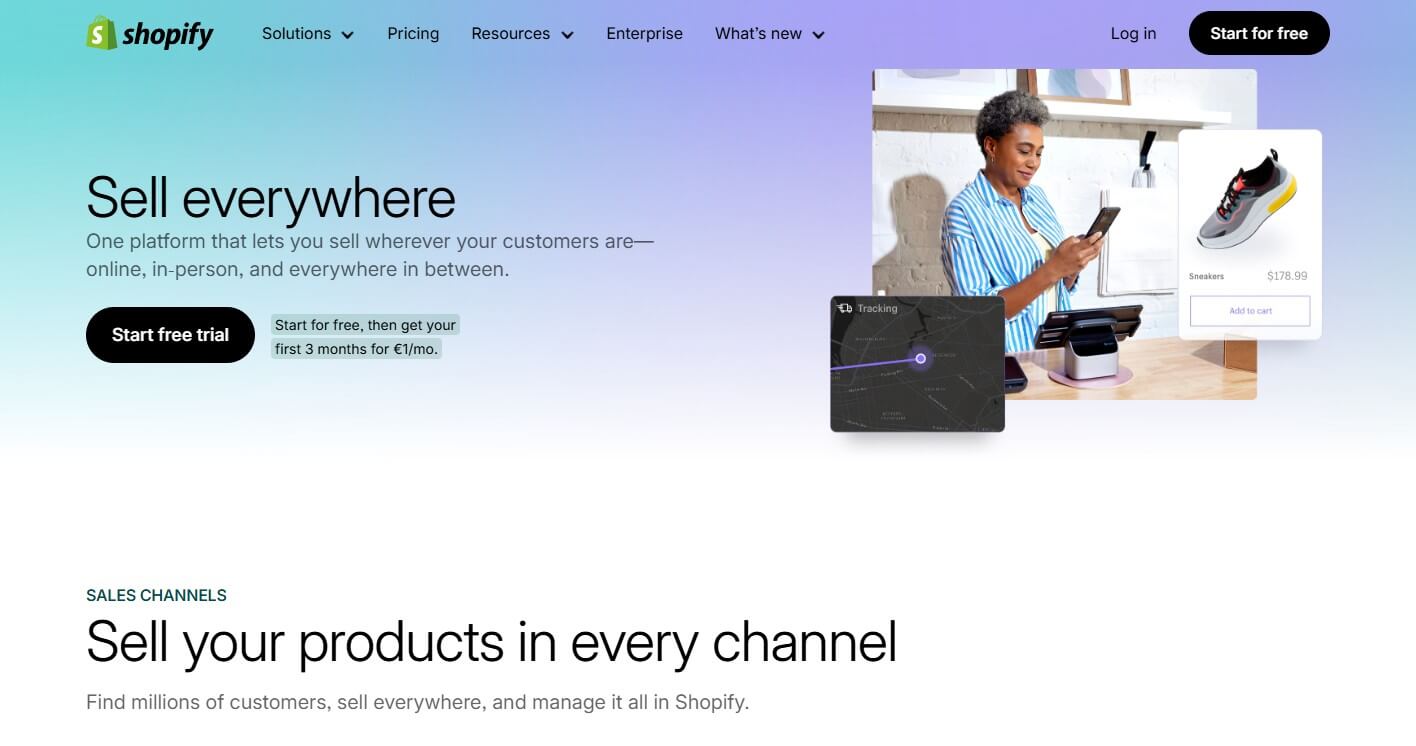
You don’t have to be crazy smart to figure out that Shopify is one of the best and most beloved e-commerce website builders. The name Shopify rings many bells, all leading to one destination: online shopping! This time, you’re the one selling and others are shopping!
Pros
- The most comprehensive sales tools
- Access to the dropshipping market
- Multi-channel selling
- Free email marketing (10,000 emails/mo)
- Extensive App Store
- You can sell unlimited products
Cons
- Costly subscription plans
- No free domain for a year
E-commerce Features
We could cut it short and say that Shopify includes all e-commerce features.
Seriously, it’s a banger. Compared to Wix, Shopify lets you sell unlimited products in all plans. Even the Basic plan, which we’ll discuss in a minute, includes access to POS (Point of Sale), dropshipping market, and dozens, if not hundreds, of global payment methods.
There’s Shopify Payments, which contains all payment methods and allows for easier payments. Moreover, Shopify’s transaction fees are fairly low, ranging from 2% to 0.6% for third-party payment providers. However, this can also depend on the customer’s payment method.
Shopify’s fee model is more adapted to mid-sized and larger stores, so smaller businesses might not be the most welcome. On the brighter side, Shopify excels in inventory management, multi-channel selling, marketing, and SEO, all essential to your success.
Email marketing is free and allows for 10,000 email sends monthly. Each plan is equipped with a store translation module, helping you adapt your online shop to worldwide users. Shopify leverages a comprehensive App Store with possibly hundreds of excellent apps.
This allows you to improve your online store capabilities, albeit at a price. When we compare Shopify to Wix, we can see its lack of design freedom and more constrained editor. However, Shopify is primarily an e-commerce site creator with a strong emphasis on swift online sales.
Plans & Pricing
Shopify is expensive, and that’s one of its primary downsides. Here’s how much it costs:
- Basic – $29 monthly
- Grow – $79 monthly
- Advanced – $299 monthly
- Plus – $2,300 monthly
While the Basic plan is enough for most people, at roughly thirty quids for a year ($360 annually), it’s hardly the most budget-friendly option. Shopify includes a few incentives, such as a 3-day free trial and three months at $1 monthly. Still, this doesn’t exclude the exorbitant cost later on.
3. Squarespace
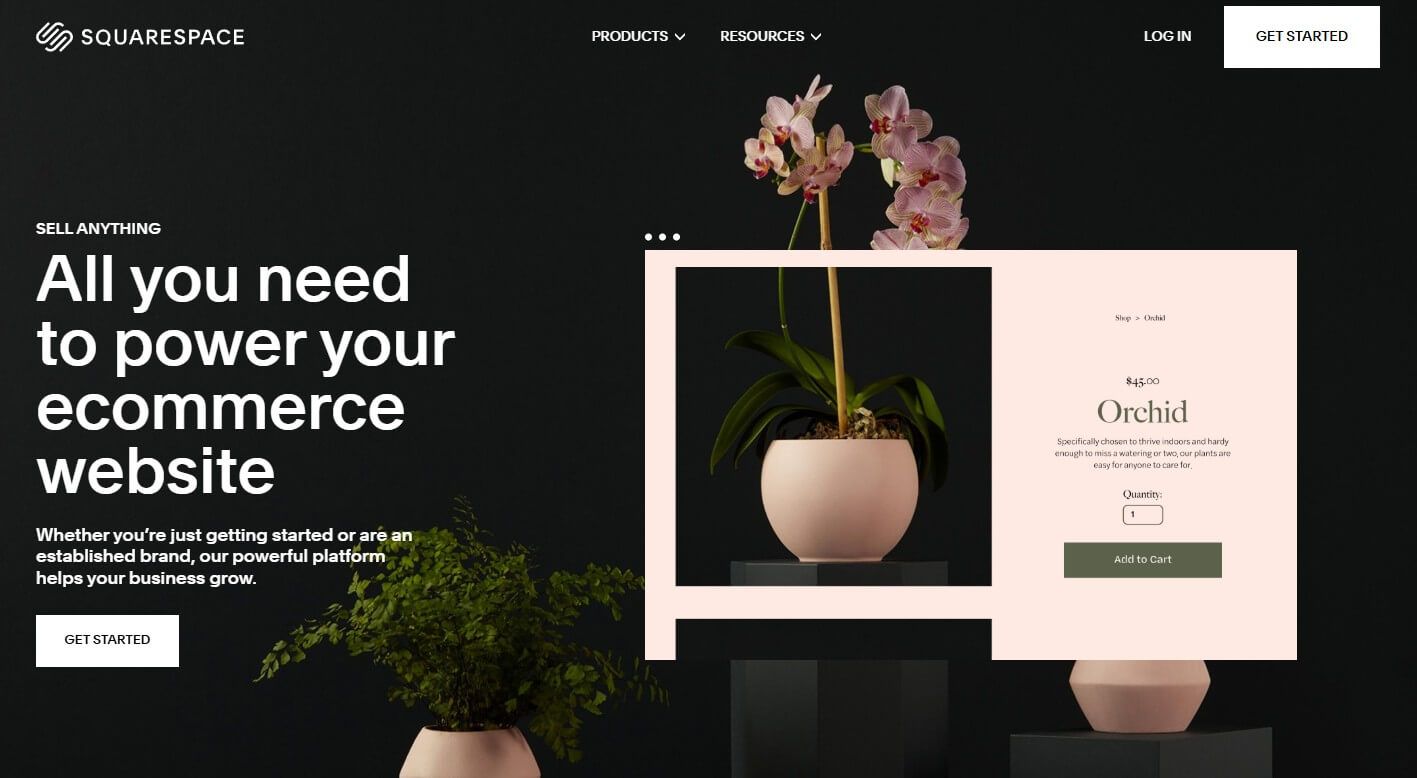
Squarespace is among the most popular e-commerce website builders in 2025. There are many reasons for that. It offers some of the best-looking templates, an incredibly intuitive website editor, and a surprisingly long list of e-commerce features for a fair price.
Pros
- Drag-and-drop editor
- Automatic tax calculation
- Up to 0% transaction fees
- Great-looking store templates
- Unlimited items in all plans
Cons
- Not the best inventory management
- Smaller selection of third-party plug-ins
E-commerce Features
Before we discuss its price, let’s see what Squarespace offers. Users can choose from over 200 free templates, all of which can be customized via Squarespace’s drag-and-drop editor. The editor automatically optimizes each design for mobile devices. Okay, but what about sales tools?
Each e-commerce plan lets you sell unlimited products. If you pick any of the Commerce plans, you’ll also enjoy 0% transaction fees; otherwise, they’re 3%, which isn’t the best. Squarespace allows full access to POS, handy for selling your products in person.
Squarespace’s comprehensive SEO tools aid website optimization and allow you to chase higher Google rankings. On the flip side, it provides nifty marketing integrations (Mailchimp is free, for example), which you can use to promote your products and exclusive sales.
Squarespace eases online sales through handy tools like automatic tax calculation, unlimited collaborators, abandoned cart recovery, customer reviews, multi-channel selling, many shipping options, and more. We also love its inventory management, although it could be improved.
Larger inventories are harder to manage, indicating that Squarespace is better suited to smaller stores despite its support for unlimited products. The provider’s plug-in store is also not as comprehensive as those in Wix and Shopify, which we hope to see improved soon.
Plans & Pricing
Squarespace’s annual plans are pretty affordable, and this is how much they cost in 2025:
- Business – $23 monthly
- Commerce Basic – $28 monthly
- Commerce Advanced – $52 monthly
Our favorite is Commerce Basic, which has 0% transaction fees, advanced shipping, POS, and more. Commerce Advanced allows you to sell subscriptions and provides access to APIs, but it costs $52 monthly. Squarespace doesn’t have a free plan but offers a 14-day free trial.
Vital to mention is the domain for a year in all plans, which only Shopify doesn’t have.
4. Hostinger Website Builder
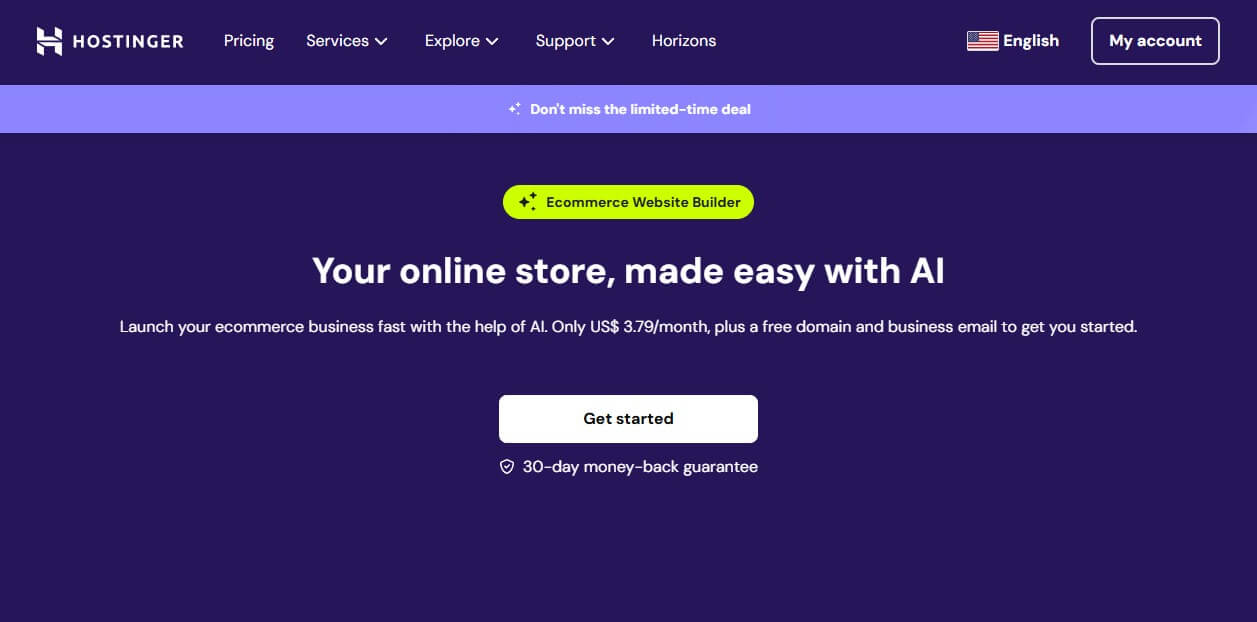
Hostinger Website Builder is expected to be the least expensive site creator on this list. Despite the low cost, the provider is one of our most recommended e-commerce website builders. Taking the fourth spot, it’s inferior to the previous three, but still has some beef.
Pros
- The cheapest e-commerce builder
- 25+ shipping methods
- AI SEO Assistant
- Easy-to-use website editor
Cons
- Limited to 600 items
- Not suitable for larger stores
E-commerce Features
Hostinger Website Builder includes a handy AI that can create an online store in minutes based on your answers. If you’d rather do it yourself, you have over 150 templates and a drag-and-drop editor. Once you’re done, it’s time to add products, up to 600 of them.
Hostinger’s 600-product limit isn’t the best, but smaller stores will find it more than sufficient. The provider includes over 100 payment methods, 0% transaction fees, and fairly simple inventory management considering the product limit. We found some features incredibly useful.
For instance, customers can leave product reviews, and you can include suggested products on the side. Hostinger lets you choose from over 25 shipping methods and set custom rules for specific products. Gift cards and discount codes are also part of this low-cost bundle.
Recently, Hostinger started including email marketing, letting you send 200 free emails to 100 subscribers monthly. SEO tools, while not the most comprehensive, provide enough for performance monitoring, especially with their AI SEO Assistant for added keyword optimization.
Hostinger lets you sell digital and physical products and services. Its nifty scheduling tool allows you to use it as a photographer to schedule photo sessions. Overall, Hostinger is among the top e-commerce site builder picks, with a few caveats that make it suited exclusively to small and start-up businesses.
Visit Hostinger Website Builder
Plans & Pricing
Hostinger’s lack of flexibility does it no good. Unlike Wix, Shopify, and Squarespace, it offers a single e-commerce website builder plan—Business Website Builder—at $3.79 monthly. The plan is billed upfront for 48 months, with 3 free months, and can be cheaper with our Hostinger promo code.
The provider includes a 30-day money-back guarantee, a free domain, and 24/7 support. While there’s also the Premium plan, we suggest avoiding it because it lacks e-commerce features.
5. Weebly
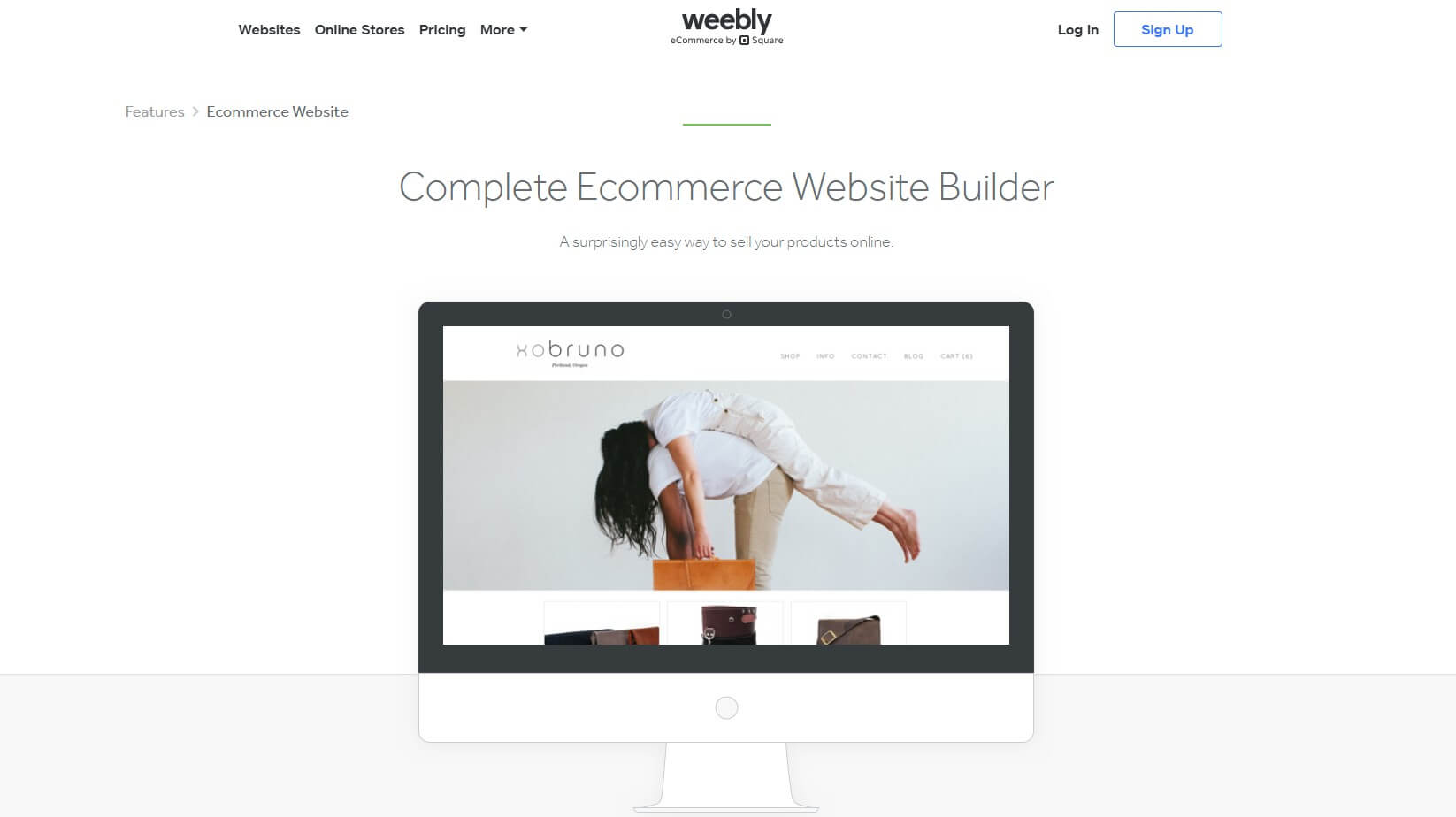
Weebly is the best e-commerce website builder that is usable for free. Believe it or not, you can sell unlimited items for free and still enjoy fancy features like a shopping cart, inventory management, POS, automatic tax calculator, gift cards, and coupons. Albeit, you’re limited to a subdomain.
Pros
- Unlimited item sales in the free plan
- No limits on storage
- Free domain in select plans
Cons
- Outdated template designs
- Average hosting performance
- Expensive Performance Plan
E-commerce Features
Weebly’s premium plans are far better, so our recommended Professional plan is the best of the bunch. Unlike the Personal plan, this one includes a free domain, unlimited storage, and built-in SEO tools. One of the most useful features we found was the shipping calculator.
It automatically calculates shipping costs, letting customers know how much they’ll spend in addition to the product’s price. Weebly also lets you add shipping labels, helping carriers deliver the product more efficiently. The provider’s highest-tier plan is called Performance.
While it’s a tad pricier than the rest, it adds item reviews, abandoned cart emails, and PayPal payments. We must say we love this one the most, but at the price, which nearly rivals Shopify, the latter is a far better pick. Yet, Weebly cleverly hid its best features behind this paywall.
If you’d rather pick some of the top Weebly alternatives, it’s okay. However, Weebly has plenty to offer regarding website creation, thanks to a combo of a drag-and-drop and a section-based website builder, which makes store creation simple even for beginners.
However, Weebly has a few notable downsides. Its templates tend to look outdated, and the fact that Weebly hasn’t updated any features for years is concerning. Weebly’s hosting performance also suffers, so it’s not ideal for large stores and frequent surges of visitors.
Plans & Pricing
Here’s Weebly’s actual pricing structure:
- Free plan
- Personal – $10 monthly
- Professional – $12 monthly
- Performance – $26 monthly
As said, you’ll want to aim for Professional or Performance plans. The Personal plan lacks a free domain and a few other helpful features. At $12 for the Professional plan, Weebly is the cheapest e-commerce website builder on the list, along with Hostinger, which costs roughly three times less.
Best E-commerce Site Builders: Ranking Methodology
Ranking the best e-commerce website builders was a hard feat. We tried to be as objective as possible while providing affordable and simple-to-use options that most people will find attractive. Here are some of the most crucial aspects we considered during this selection:
- Sales tools. This was the #1 aspect. We wanted e-commerce site builders that cover more than the basics. As you’ve had the chance to see, all providers come with multi-channel selling, customizable shipping, popular payment vendors, e-commerce templates, and more.
- Low transaction fees. We emphasized providers that come with up to 0% transaction fees. Regardless of your choice, transaction fees will rarely go over 3%, which makes our recommended e-commerce platforms very competitive.
- Ease of use. Creating an online store should be straightforward and hassle-free. We opted for the best e-commerce site builders with drag-and-drop editors that endorse no-code site-building. Additionally, providers like Wix and Hostinger provide AI site builders that can make a website from scratch without your input.
- Marketing and SEO tools. These two are immensely important for your online store. The majority of our top picks have built-in email marketing and comprehensive SEO tools to help you promote and optimize your store for better results.
- Third-party integrations. Let’s not forget third-party apps and plug-ins that can improve your online sales capabilities drastically. Wix and Shopify lead the way with hundreds of high-quality apps for marketing, store design, SEO, social media, and more.
- Value for money. This is likely the most vital aspect. Our top five e-commerce site builders excel in value for money, offering free domains, generous storage and bandwidth, and timely support. Best of all, they start as little as $3.79 monthly!
Steps for Starting an Online Store in 2025
Starting an online store is easy with the best e-commerce website builders. However, many people also consider e-commerce web hosting, which they often pair with a CMS like WordPress (WooCommerce), Magento, or any other.
Whatever the case, in our experience, the path is nearly identical. Here are some of our insightful steps on starting and maintaining your online shop:
- Select the best e-commerce website builder.
- Get a domain name. You can do it for free with Wix.
- Select an adequate template and customize it.
- Prepare and add products with images (or videos) and descriptions.
- Set up payment methods (you can also use built-in solutions like Wix Payments).
- Configure shipping.
- Translate your store into multiple languages.
- Test your online store and publish it.
As you can see, starting to sell online doesn’t take the brightest mind. After selecting the best e-commerce site builder, you add your products, configure payments and shipping, and publish the store. Of course, this is a general guide. You’ll surely add your own touch along the way.
Publishing an online store is just the beginning. You’ll need to rely on adequate SEO and persistent marketing to keep things afloat. Luckily, your top-rated picks have all the tools you need to make a thriving online shop.
E-commerce Site Builders: The Final Verdict
The best website builders optimized for e-commerce are necessary for effective online sales.
Wix, Shopify, and Squarespace are our go-to options for the most demanding and ambitious people. They provide the best sales tools, plenty of features, hundreds of masterfully crafted templates, and low transaction fees. We’d also say they’re great for both smaller and larger online stores.
Hostinger Website Builder is the cheapest option. A unique proposition with stellar sales tools, fast hosting, and an AI builder at under four quids. Finally, there’s Weebly, which isn’t necessarily our favorite, but still a phenomenal option for free, unlimited sales with some of the lowest fees.
Frequently Asked Questions
How much is an e-commerce website builder?
Our Hostinger Website Builder test praised its affordability, but e-commerce site creators usually cost way more. Wix, our #1, starts at $29 monthly, while Squarespace is $23. Shopify’s price tag of $29 monthly is nearly on par, which implies that the best options usually cost above $20.
This price is definitive for most users because it typically includes all sales, marketing, and SEO tools needed for long-term success. We should also address transaction fees. Some providers offer 0%, while others go up to 3%. The lower the fees, the more money you’ll be able to make.
So, the cost of selling online usually includes the website builder and fees, while long-term costs may include annual domain name renewals and add-ons, if you need additional functionalities.
Is WooCommerce better than e-commerce site creators?
Yes and no. WooCommerce is a WordPress plug-in for online sales. This means it requires proper WooCommerce hosting to be installed. WooCommerce heavily relies on third-party apps to function, so it’ll be a much costlier option in comparison.
If you spend more on WooCommerce, you can equip it just as well, if not better than, the top e-commerce website builders. Both WooCommerce and site builders are ultimately great options, but the majority will find the latter a bit simpler and more cost-effective.
Is Shopify good for small businesses?
It can be used, but the general consensus is that it’s better for mid-sized and larger businesses.
Shopify’s fee model is more suited to larger businesses that make more sales. Given the considerable transaction fees in the Basic plan, smaller businesses with fewer sales may not be able to earn that much. We think Wix and Squarespace are superior options for this scenario.